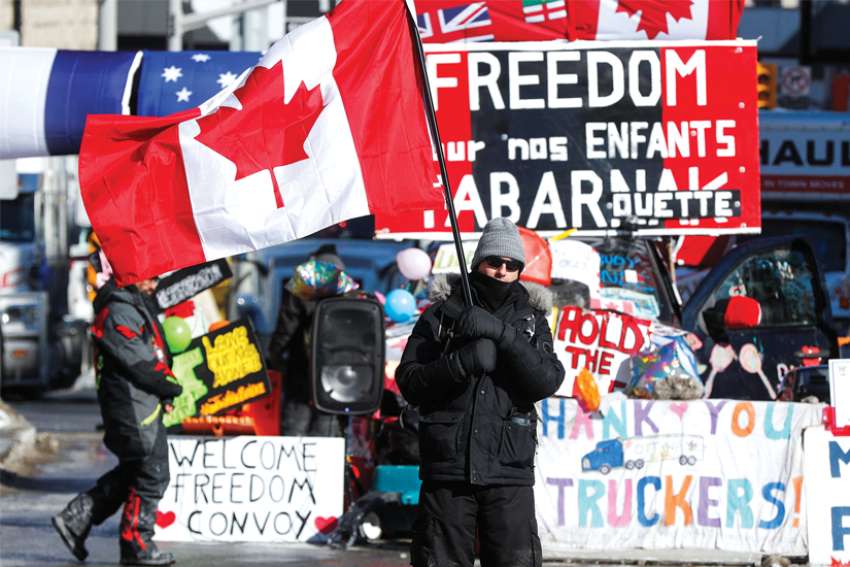I was arrested three times in my 20s for participating in faith-motivated acts of civil disobedience. My joke is that the only thing I have ever been arrested for is praying. Non-violent direct action is sometimes necessary to be witness to what God requires of us. Jesus cleansing the temple would hardly fall under the category of orderly protest for example. Non-violent direct action is inherently disruptive. It seeks to reveal and disrupt systems of power that unjustly oppress and violate our human dignity.
I have sympathy for those who feel alienated by the current establishment. I have sympathy for people who are tired of wearing masks. I am tired of wearing a mask. I even have sympathy for those whose values make it difficult for them to choose vaccination, including people that I know and love. But mostly, when it comes to these protests, I just felt angry.
Yes, anger. Was I just jealous that as a young activist I had no access to a protest tool as effective as a transport truck? No. What upset me were stories of ordinary citizens in Ottawa being subject to harassment to the point that an injunction had to be sought. I pictured myself trying to sleep in one of those neighbourhoods with horns blasting. Many of those people are working-class folks who do shift work. It seems to me that the people whose lives have been most disrupted by the protests are ordinary citizens and not at all the people in power who are their target.
I also thought of all the trucking associations who have distanced themselves from the protests and the truckers who chose to keep doing their jobs and getting goods to where they need to go. What would it be like to be such a trucker now? Would people wonder, “Were you one of those people?”
But I think the main source of my anger is the anger I feel whenever I hear anyone, for any reason, complaining about their rights being violated when really, they are being asked to sacrifice something for the common good. Individual human rights are fundamental to the well-being of any society, but so are the responsibilities that same individual has towards their fellow citizens. And that is how I found myself thinking about my Grade 11 civics teacher, Ms. Johnson.
I remember one of her classes where the topic was human rights. We focused a lot on the individual human rights that we all know and cherish so well as Catholics, starting with the right to life. But then Ms. Johnson said, “and what about our responsibilities class?” Dead silence. We were a bunch of teenagers — my rights are what are important, not my responsibilities! But Ms. Johnson helped us see.
After that class I could see how hard it would be for society to function at all if it were just a bunch of individuals screaming about their rights all the time. I could see how blind it was to speak of one’s rights with no consideration of balancing them with their duties towards the common good.
I am not sure if she knew it or not, but Ms. Johnson was taking a page right out of the compendium of the Church’s social doctrine. Our faith teaches us that rights and duties are “indissolubly linked.” It quotes the encyclical Pacem in Terris, “Those, therefore, who claim their own rights, yet altogether forget or neglect to carry out their respective duties, are people who build with one hand and destroy with the other.”
What is being asked of us as citizens in the balancing of rights and duties is not unreasonable. Those tasked with ensuring the common good in the context of a global pandemic are not disrupting this balance. There is no need to reveal and disrupt gross injustice and violent oppression, because when it comes to how we are trying to fight the pandemic together, it does not exist. Three-quarters of Canadians think the convoy protesters should go home. I would add that they could use a lesson from Ms. Johnson.
(Stocking is Deputy Director of Public Awareness & Engagement, Ontario and Atlantic Regions, for Development and Peace.)


